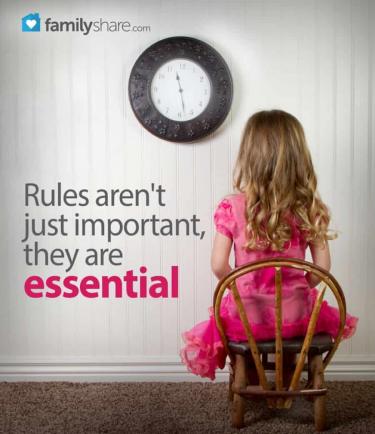
Parents are faced with decisions each day that involve rules and boundaries. They are incredibly important concepts to understand for parents who have little ones to manage. The important question "how much?"� is demonstrated when we see children who are bent on the taste of rebellion after having been fed a steady diet of parental oppression. The polar opposite tends to lead to a similar outcome. Parents who offer their children no limits are likely to find unruly children at the playground and at home. If gone unchecked for too long, children may demonstrate impulsive and reckless behavior even into adulthood.
So what are rules and boundaries? Rules are explicit or implicit statements intended to control an aspect of behavior, usually with an attached consequence.For example, Timmy must brush his teeth every night or he can't have his favorite story time with daddy. Rules set boundaries or limits between appropriate behavior and inappropriate behavior.
So how do parents effectively set limits around child behavior without oppressing and controlling excessively? Jim Fay and Foster Cline (2006), in their book Parenting with Love and Logic,
have suggested the V of Love as a guide for parents in setting limits. Understanding this concept will help young parents establish a healthy pattern for setting limits and avoiding power struggles with their children.
The V of Love
suggests that a child's availability of choices (rules or limits) should be narrower during childhood and less restrictive on into adulthood. Often parents do the opposite. They set few limits on their child's behavior while they are young and with increasing irresponsibility they tighten control into adulthood. But this goes contrary to human nature. Children will surely fight against this parenting pattern.
As children demonstrate their ability to follow rules while they are young, parents can fortify their relationship of trust by offering more choices and freedom.As we get older we become more experienced and want to explore more of our world, but if parents set more rules and boundaries, then comes a power struggle. This is true in parenting and in the human condition. Humans desire increased freedom - not servitude.
But what if my child frequently disobeys? Look for ways to remove privileges that equal the crime. If a child comes home later than you asked, try removing that privilege for a day - not the summer, or the rest of their life. In this way punishments can still happen without complete loss of freedom and loss of trust.
Rules and boundaries are beyond important for parenting: they are essential. They protect our children from being run over in the street and lying to the teacher. Society functions on rules and in order to become productive members of society children are going to need our love and limits.
Source: Parenting with Love and Logic. (2006). Fay. J. & Cline, F.

